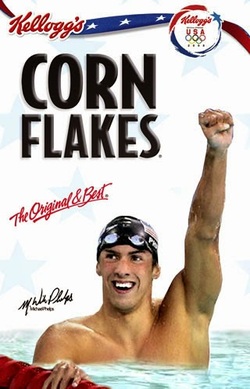 Branding: it does a celebrity body good.
Branding: it does a celebrity body good. The sequence of events usually goes like this: A celebrity writes a song, does a media interview, or marries another celebrity (who may or may not be famous solely because of their name). The celebrity makes some unique, whatever (or not so unique, in the case of “This Sick Beat”) that the media quickly seizes upon, spreading it far and wide. Because the celebrity is well-known, their name is associated with the unique word/comment/symbol without much effort by the celebrity him/herself. The phrase may even be incorporated into a viral YouTube video, or acquire its own hash tag, like Charlie Sheen’s #winning rant (in reality, this wasn’t really a winning trademark strategy as Sheen hasn’t yet obtained his registration). Either way, the celebrity will have no problem acquiring the goodwill that other trademark owners may have to pay hundreds of thousands (or millions) of dollars to acquire.
I’m starting to believe that these pop star attempts to register trademarks for names and obscure catch phrases are really a unique sign of the times. It’s a time when social media seizes on off-the-cuff remarks, helps them go viral, and gives added fame and recognition to the source of the off-the-cuff phrase. In other words, activities that all contribute to enhancing the goodwill of a particular phrase. These are tools that celebrities of yore did not have access to. Dick Van Dyke, Lucille Ball, and Sean Connery (just to name a few) all had the opportunity to petition the same trademark office as today’s celebrities did, but trademark applications and registrations by these legends of yore are as conspicuously absent as straps of clothes on a certain celebrity during a certain Super Bowl halftime performance.
Maybe the answer lies in the ability of today’s celebrities to really publicize and exploit a name or identifier through social media. Merchandiser partners producing goods can use the same social media outlets to reach an even bigger audience of consumers, boosting sales of the underlying product. The struggle for the celebrity (indeed for any company that is seeking to maximize its trademark rights through merchandising) needs to have a plan for obtaining trademark rights, recognizing the specific goods and services that the mark will be used on. This requires foresight to really hone in on the goods that the celebrity is offering. Otherwise, a trademark kitchen sink “land grab” approach is likely to fail as trademark rights attach through use of the mark, not mere registration. Even Charlie Sheen’s ubiquitous and infamous “Winning” series of trademarks, with all of its recognition on social media could not overcome the cold hard realities of getting a series of suppliers to make everything from vitamin supplements to action figures with the slogan “Duh Winning”. In short, celebrities have to have the connections in the biz to develop the products or offer the services themselves or at least license out their trademark to others who can develop the products and offer the services.
It appears Renee Kardashian either has no connections or has the foresight to limit a description of services at the trademark office to “keep it real”, under the parlance of our times. Then again, maybe Ms. Kardashian is simply laying the groundwork for a much broader push for trademark rights later, using such broad claims as “advertising services” and “entertainment services”, services that are no doubt in the purview of her soon-to-be-acquired surname, at least if the track record of her future in-laws are any indication.
So what am I trying to say with all of this? As annoying (and unprecedented) as these celebrity name reservation pushes might be, they are perhaps very nice specimens for how business owners can effectively protect their brands:
1. Seize early on the flash-in-the-pan moment by protecting a name
2. Rely on customers, and any other person/place/thing that can spread the word about the brand and generate that all-important goodwill
3. Paint with a broad brush by describing what your business will do; you can get into specifics later once the bottom line is a little juicier.


 RSS Feed
RSS Feed